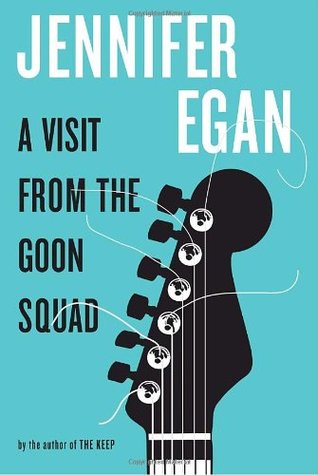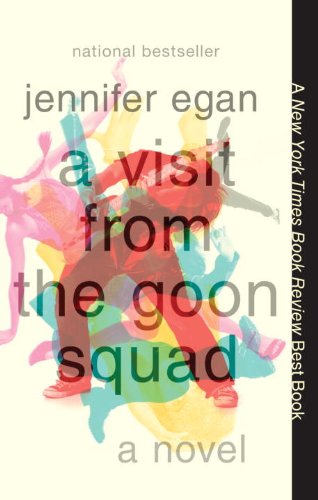

As far as I can tell, you have to be an American to win the Pulitzer Prize. This comes as a relief to me, because I can criticise Jennifer Egan's Pulitzer Prize winning A Visit From The Goon Squad without being asked "Where's your Pulitzer, Mister Critic?†(If I were American, it would hang on the wall of my office, next to a copy of the prize winning article, "Why the world doesn't need Supermanâ€).
I can understand why A Visit From The Goon Squad won plaudits: it's so painfully worthy. Substance abuse, daddy issues and the guilt of being upwardly mobile are all addressed within these thirteen short stories masquerading as a novel. These are themes that are so common in American literature that they have come to define it. I have to wonder if some authors feel discouraged if they have written a book without troublesome parents, casual drug use that turns catastrophic or, in the last ten years, at least passing reference to living in a post 9/11 world.
Egan doesn't have to worry about any of that; it's all in here, and she has the Pulitzer to show for it.
A Visit From The Goon Squad concerns characters whose lives have intersected in some way, however small. This collection of vignettes ranges from a record producer failing to maintain an erection, an executive assistant failing to keep her kleptomania in check, groupies in their prime and in their waning years, all the way to a tarnished PR rep trying to rehabilitate a genocidal dictator. All of this "with music pulsing on every pageâ€! I can't pretend I know what that means.
For the most part, this book is not structurally out of the ordinary: every chapter is from the perspective of a different character, sometimes in first person, mostly in third, and once, even, in second. The time line has no specific order except beginning and concluding with what Egan obviously considers appropriate bookends.
However, a great deal has been made about the fact that one of the chapters is in the form of a PowerPoint presentation. Amazing: an author learned how to use PowerPoint in the creation of her book! Rather than seeing this as petty and gimmicky, it's somehow a revelation to a lot of readers. I don't want to come across as cynical (though I suspect it's too late for that), but presenting something in an unorthodox fashion doesn't instil it with meaning. Would a 12 year old girl really use PowerPoint as a special sort of diary examining her father's relationship with her older brother? I'm not convinced.
Similarly unconvincing is the final chapter, where Egan moves into the dreaded genre of futurism. Egan casts her mind into the 2020s, convinced that the "war†(which one?) only went for fifteen years and the ensuing baby boom created an infantilised society where everyone communicates via an infuriating variation on text speak – which of course only exists in fiction. Rather than being dystopian or clever, Egan's vision of the future is simply lazy and ill-defined. One can't exactly guess what Egan was going for except to use the future to expose the ghosts of the past while exploiting the tenuous web of interconnections she has built over the preceding twelve stories. Some of the links are contrived to the point of insulting the readers' intelligence instead of providing the neat closed loop that I assume Egan was going for. It's cutesy, and one does not normally associate cutesy with the conceit that life disappoints in every way and that happiness is attained only through the severe lowering of standards that is supposed to permeate these stories.
Individually, most of these stories aren't terrible; as a whole, they're not as cohesive as Egan would like to think. She has no overarching goal excepting the general misery of her generally miserable characters. Even the ones who think they are happy know deep down that they're not, and simply have to remind themselves of this fact.
She sells some of these characters short, with one of them literally killed by subtext because consulting the truth of his situation would be too compelling for us to handle. This character showcases some of Egan's most vivid writing, but she throws it away as a means of developing one of her other characters who has a stronger claim in the alleged main narrative. A similar fate befalls Ted Hollander, who makes the mistake of being the uncle of that same character and therefore exists only to service her development. The guy never stood a chance, which is a pity, as the examination of his marriage is something close to meaningful.
No real reason is given for Sasha and Bennie being the totems on which Egan hangs her "storyâ€; we don't get particular insight from Bennie at all, except his involvement for completeness' sake and to make the final chapter that much more embarrassing. I understand Egan's Proustian mission statement but I don't know why she chose to go about attempting it in this way.
Despite the generally acceptable nature of these individual stories, there is one that is largely unforgivable and entirely irredeemable: Forty-Minute Lunch. It's a style piece designed to emulate self-important journalists who insert themselves into their own stories rather than condescend to address the subject matter of the article at hand, and it is an infuriating to read. Not being well versed in the ways of David Foster Wallace, I'm not sure if this is supposed to be reminiscent of his work (footnotes!), but it strikes me as a definite pretension and a story that is not fun to read at all.
The self-aggrandising on display is breathtaking in its ability to cause brow furrowing, and the contempt that Egan shows for the reader. That is, unless I misread it and we're supposed to feel for this unambiguously broken man whose self pity and loathing is exceeded only by his narcissism. We inhabit this character's head too closely, and though we know this chapter is supposed to be a subversion of form it is more an entirely reflection of one man's pathetic nature. I didn't like it at all. An already delicate book is almost brought down, and would have been were this chapter not immediately followed by two of the book's strongest. Of course
A Visit From The Goon Squad isn't a terrible book, but it thinks that it's much more significant than it could ever hope to be. What purports to be a rich tapestry is little more than loose threads trying to muster dignity. The individual moments don't add up to anything, and with more than a few painful sequences – and even some obscure stuff that Franzen did better ten years earlier (who writes about unlikely Americans propping up foreign dictators?) – it's not strictly worth the time it takes to read it. You've read largely the same material before … but not in PowerPoint. I guess that cinches it across the line into Pulitzer prize winning material.

No Responses